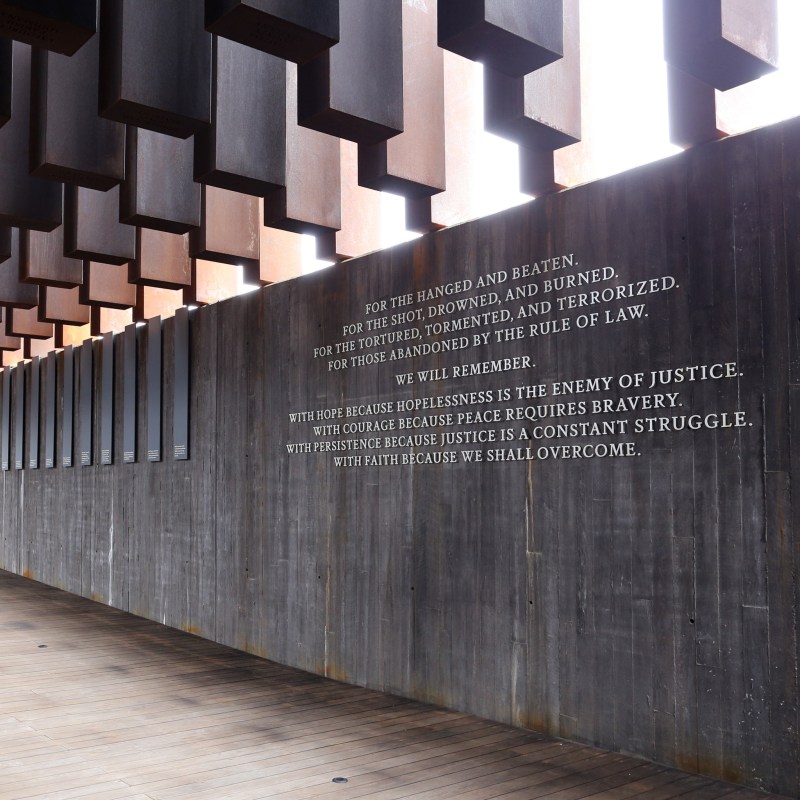
As the nation continues its annual celebration of Black History Month, anyone interested in learning could get quite an education with a visit to Montgomery, Alabama, which proudly proclaims itself as the birthplace of the civil rights movement.
There are countless historical sites to visit in Montgomery, Alabama’s state capital and its second-largest city, which is located on the Alabama River, about 150 miles north of the Gulf of Mexico.
Montgomery was home to Rosa Parks, Martin Luther King Jr., and other civil rights icons, and much of that history can be found in the city today.
“Montgomery provides visitors with an enlightened perspective that they can’t find anywhere else,” said Dawn Hathcock, Senior Vice President of the Montgomery Area Chamber of Commerce. “Our thought-provoking cultural and civil rights experiences remind us of how far we have come and inspire us to continue fighting for change.” Must-sees on a visit to Montgomery include:

1. Rosa Parks Library And Museum
Located at 252 Montgomery Street, the Rosa Park Library and Museum is part of nearby Troy University. The museum chronicles her life and the incident during which Parks boarded a bus in December 1955 and refused to give up her seat. The museum was dedicated and opened exactly 45 years later to the day.
A permanent exhibit is on hand dedicated to the Montgomery Bus Boycott that followed Parks’ arrest.
Two other exhibits are currently on view in the museum, one dedicated to civil rights documents and photographs chosen by students, and a second that chronicles the struggles of African-Americans in the Jim Crow era.
The museum is open on weekdays for tours with strict COVID-19 restrictions; virtual tours via Zoom are also available.

2. Rosa Parks Statue
For those seeking an outdoor alternative, a statue of Parks was unveiled in late December in downtown Montgomery at the corner of Moulton and Montgomery Streets. The location is where Parks was arrested. The bronze statue is dedicated to her courage and efforts in the civil rights movement.

3. Montgomery’s Civil Rights Memorial
Operated by the Southern Poverty Law Center, the Civil Rights Memorial is located at 400 Washington Avenue. It features a black granite table enshrined with the names of the martyrs and chronicles the history of the movement.
The memorial was designed by Maya Lin, the same artist who designed the Vietnam Veteran Memorial in Washington. It is designed as a contemplative area where visitors are encouraged to touch the names of those enshrined.
It is located just around the corner from the church where Martin Luther King Jr. preached during the Montgomery Bus Boycott and the State Capitol where the Selma to Montgomery voting rights march concluded in 1965.

4. Dexter Avenue King Memorial Baptist Church
The church where Dr. King preached nearly seven decades ago is still home to an active congregation with regular Sunday shrives, Bible studies, Sunday school, and other activities. But the Dexter Avenue King Memorial Baptist Church is also a National Historic Landmark.
Located at 454 Dexter Avenue, the church normally hosts tours. But since the onset of the coronavirus pandemic, tours have been suspended. The exterior and some portions inside the church remain popular locations for photos.
5. The Legacy Museum
Located at 115 Coosa Street, The Legacy Museum: From Enslavement to Mass Incarceration calls out racial inequality and racial injustice in the United States. It is located where slaves were once warehoused and one block from one of the busiest slave auction spaces in the country.
Opened in 2018, the museum chronicles slavery, lynchings, segregation, and racial hierarchy as well as current issues including mass incarceration and police violence.
Operated by the Equal Justice Initiative (EJI), admission to the museum is free, although there are strict coronavirus restrictions.

6. The National Memorial For Peace And Justice
Opened in conjunction with the Legacy Museum by the EJI, the National Memorial for Peace and Justice is a 6-acre park overlooking the city. Located at 417 Caroline Street, the memorial was built to be a sobering site where visitors can reflect on America’s history of racial injustice.
The memorial is filled with paintings, sculptures, and writings from people including Toni Morrison, Elizabeth Alexander, and Dr. King. At the center is a reflection space built in honor of Ida B. Wells.
7. Dexter Parsonage Museum
Located at 309 S. Jackson Street, the Dexter Parsonage Museum is the former home of Dr. King. The home where Dr. King and his family lived from 1954 to 1960 has been restored to the appearance it had when he lived there. Permanent exhibits are on hand, and tours are available.

8. The Freedom Rides Museum
Located at 210 S. Court Street, the Freedom Rides Museum is dedicated to the story of the Freedom Riders, who forever changed Montgomery and other Southern cities. Their goal was to end racial segregation on public transportation with nonviolent protest.
Know Before You Go
There are countless other sites in Montgomery and neighboring towns that played a role in the civil rights movement, including restaurants, hotels and motels, and other businesses. All can be taken in as part of a trip to Alabama.
“The current social justice movement has ignited an overwhelming desire and demand for educational and purposeful travel,” Hathcock said. Montgomery certainly fulfills that demand. For additional inspiration, consider:
